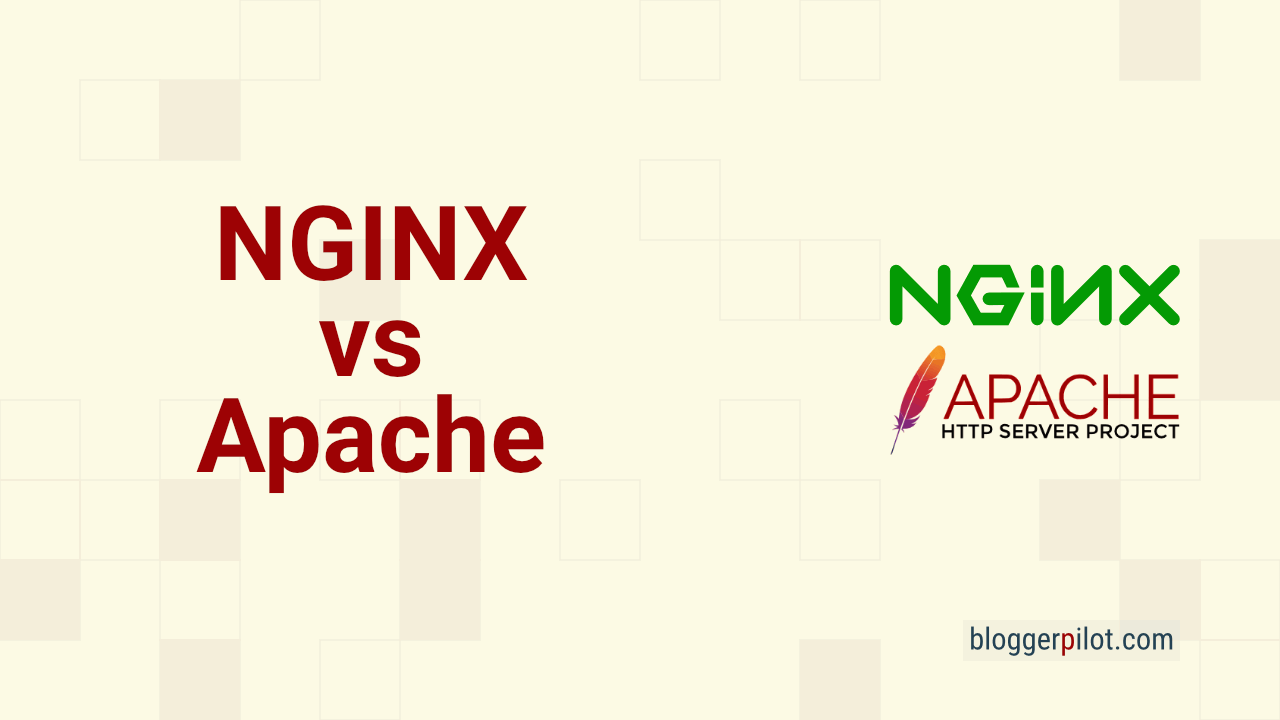NGINX vs Apache ᐅ Comprehensive Web Server Comparison 2025
Choosing the right web server software is crucial for the performance and security of a website. Two of the most popular options are NGINX and Apache. Both have their strengths and weaknesses, and picking between the two can be complex. In this blog post, we’ll compare NGINX and Apache in detail to help you decide.
A web server accepts HTTP requests from clients and sends them back web content in response. It acts as an interface between users and stored resources such as web pages. Web servers are essential for hosting websites and web applications. Two examples are NGINX and Apache.
Here is a clear table that compares the most important aspects of NGINX vs Apache:
| Criterion | NGINX | Apache |
|---|---|---|
| THE argument | Is faster | Wider support |
| Background | Founded in 2004 Developed by Igor Sysoev Focus on C10K problem | Founded in 1995 Developed by Apache Software Foundation First market leader |
| Architecture | Event-driven, asynchronous | Process or thread based |
| Performance | Very high for static content Advanced caching | Good with dynamic content |
| Flexibility and customizability | Extensible through modules, but more complex Central configuration file Versatile as web server, reverse proxy, load balancer | Modular architecture .htaccess for granular configuration Broad support for scripting languages |
| Security | Robust DDoS protection Modern SSL/TLS support Various authentication methods | Integrated web application firewall (ModSecurity) Detailed access control Wide range of authentication options |
| Community and support | Small but growing community Professional support available Specialized events | Large, active community Extensive documentation Active mailing lists and forums |
This table should provide a quick overview of the key features of NGINX and Apache and help with decision-making.
Overview: Nginx vs Apache in the year 2025
The year
Why this comparison is relevant
In an era where website and web application performance, security and scalability are critical to business success, choosing the right web server is of immense importance. A wrong move here could result in lost business, reduced performance and even security-related vulnerabilities. With the ever-changing technology landscape, it is essential to provide the most relevant and up-to-date information to make an informed decision.
Target audience for this article
This article is aimed at CTOs, system administrators, developers and decision makers who are faced with the difficult task of choosing between Nginx and Apache. Likewise, it offers insights of interest to anyone seeking a clearer understanding of the Web server landscape in 2023.
By considering architecture, performance, security and other critical factors, this article strives to provide you with a comprehensive comparison of both technologies. The information provided here should serve as a valuable tool in your decision-making process.
Web Server Technology Basics

What is a Web server?
A web server acts as an intermediary between a client, typically a web browser, and a collection of resources known as websites. Typically, the web server processes HTTP requests and generates HTTP responses, including the content specified in the request.
The roles of Nginx and Apache in the web server landscape
Nginx: the performance maestro
Nginx was originally developed with the main goal of addressing performance issues such as high latency and CPU usage. With its event-driven architecture, it quickly established itself as the ideal choice for high-performance web applications.
Apache: The all-rounder
Apache, the pioneer in web server technology, offers a wide range of modules and is known for its robustness along with reliability. It has a large, active community and therefore offers a wide range of extensions and customization options.
Historical background of Nginx and Apache

The origin of Apache
- Foundation and Development: Apache was released in 1995 by the Apache Software Foundation and is one of the oldest web servers. Originally developed as a fork of the University of Illinois NCSA HTTPd web server, Apache quickly became the web hosting of choice.
- Growth: Apache dominated the web server market for many years and at times had a market share of over 70%. Although market share has declined in recent years, Apache remains a strong choice for many developers and organizations.
- Community and Open Source: Apache has one of the largest open source communities. The software is constantly updated also improved, there are many modules and extensions.
- Influence: Apache has been instrumental in shaping standards such as the HTTP protocol and offers a variety of features that have been adopted in many other web servers.
Apache was launched in 1995 as part of the Apache Group project and has since established itself as one of the dominant web servers on the Internet. Its origins lie in the NCSA HTTPd web server software that it replaced.
The birth of Nginx
- Foundation and development: NGINX was originally developed by Igor Sysoev and released in 2004. Sysoev started the project to solve the C10K problem, which refers to the ability of a web server to serve numerous clients simultaneously.
- Growth: the software quickly gained popularity, especially among websites that needed high performance and scalability. Today, NGINX is one of the most widely used web servers and is used by some of the largest websites in the world.
- Company History: In 2011, NGINX, Inc. was founded to provide commercial products and support for NGINX. in 2019, the company was acquired by F5 Networks for $670 million.
- Impact: NGINX has significantly influenced the way modern web servers are developed and scaled, and is known for its asynchronous architecture.
Nginx was launched much later, in 2004, by Igor Sysoev. Originally developed as a response to the C10k problem, which describes a web server’s ability to manage tens of thousands of connections simultaneously, it has excelled in performance and modularity.
Through this historical outline, it becomes clear how the two technologies differ in their development and core competencies. This contrast will be further explored in the following chapters to provide you with a comprehensive basis for decision-making.
This will give you a deeper insight into the history and influence of NGINX and Apache.
Architecture and Performance
NGINX
- NGINX: Known for its high-performance and low resource consumption. It is particularly well suited for high traffic websites.
- Asynchronous Architecture: One of the main strengths of NGINX is its asynchronous, event-driven architecture. This allows it to handle a high number of concurrent connections with minimal memory consumption.
- Load Balancing: NGINX is known for its efficient load balancing capabilities, which can distribute the load evenly across multiple servers to ensure optimal resource utilization.
- Caching: NGINX offers advanced caching options that help reduce response times and put less load on the server.
- HTTP/2 and SSL: NGINX supports advanced protocols such as HTTP/2 and offers robust SSL options that can further improve server speed.
- Metrics: In various benchmarks, NGINX has often performed better in terms of request rate and latency.
Apache
- Apache: Extensible through modules, which makes it very flexible, but may consume more resources.
- Modular architecture: Apache uses a modular architecture that allows it to load only the functions that are needed. However, this can lead to increased memory consumption if not configured carefully.
- .htaccess: Apache allows granular configurations at the directory level through .htaccess files. Although this is flexible, it can impact performance.
- Keep-Alive: Apache supports keep-alive connections, which can reduce latency but also increase memory consumption.
- MPMs (Multi-Processing Modules): Apache provides several MPMs such as Prefork, Worker, and Event that can affect load times depending on the use case.
- Metrics: In benchmarks, Apache often shows a lower request rate and higher latency compared to NGINX, especially with high traffic.
Each web server has its strengths and weaknesses, and the choice should be based on the specific needs of your project.
Since Nginx interprets requests as URI locations, it can not only act as a web server, but also easily serve as a proxy server, load balancer and HTTP cache.
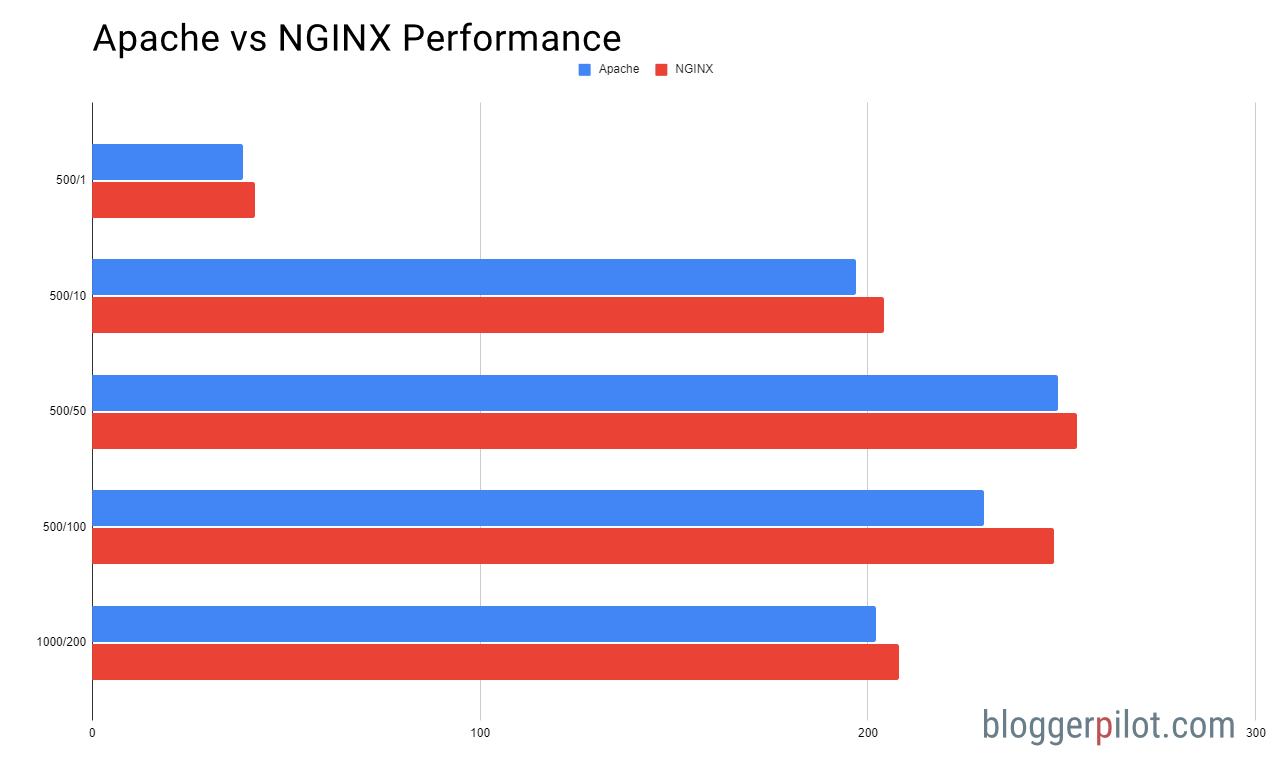
In the duel between Apache and Nginx, Nginx once again convinces in terms of transfer rate. Here, Nginx outperforms the competition in most cases and clearly in the 500/100 test.
Event-Driven vs Process-Driven Architecture
Event-Driven: Nginx
Nginx uses an event-driven architecture, which is particularly suitable for applications with high loads. This architecture allows for better scalability through asynchronous, non-blocking operations. In short, a single worker thread can handle multiple requests simultaneously.
Process-Driven: Apache
In contrast, Apache relies on a process-driven or multi-threaded architecture. Each request is handled in its thread or process, which provides excellent isolation but limits scalability, especially as request rates increase.
Memory consumption and resource efficiency
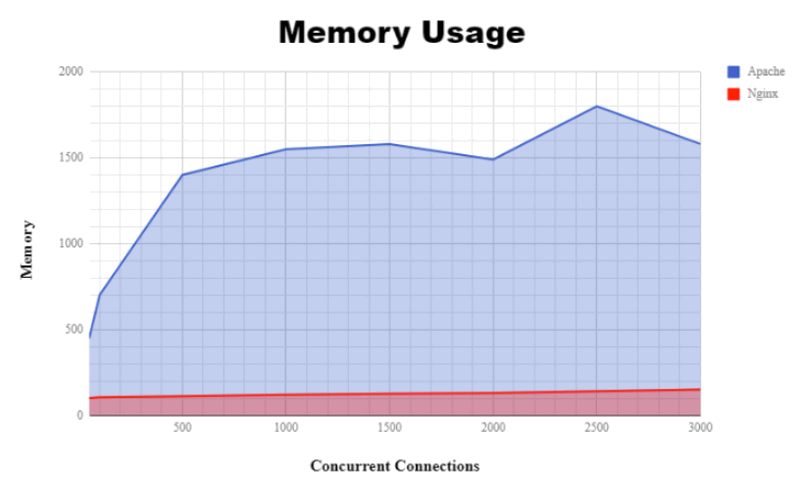
Nginx as the clear winner: as you can see, Nginx emerges as the undisputed winner in this test. The differences are so glaring that they are almost hard to believe.
Resource efficiency with Nginx
Nginx scores high in resource efficiency due to its low memory consumption. Since it requires fewer threads, it is less resource intensive, which can play a crucial role in cloud environments and containerized applications.
Apache’s memory consumption
Apache, due to its architecture, can consume more resources in high load scenarios. However, it offers more flexibility in configuring performance parameters.
Performance with static and dynamic content
Nginx: static content performance
Nginx shows its strength predominantly in delivering static content such as HTML, CSS and images. Its architecture is optimally designed to efficiently process large amounts of such data.
Apache: Dynamic content
Apache, on the other hand, is better optimized for dynamic content. Thanks to a wide range of available modules, Apache HTTP Server can handle more complex server tasks, such as server-side script execution.
Benchmarks and case studies
Performance metrics
Various benchmarks show that Nginx is superior in raw performance in most cases, especially when it comes to delivering static content. However, Apache can match it often through specialized configurations and extensions.
Case studies
Companies like Netflix and WordPress.com use Nginx for their high-traffic scenarios. Apache, on the other hand, often finds its place in enterprise environments with many backend applications.
In this chapter, we analyzed the architecture and performance of Nginx and Apache. In doing so, we saw that both web servers have their strengths and weaknesses that qualify them for different application domains.
Flexibility and customizability
NGINX
- NGINX: Offers a wide range of features “out of the box” and is extremely customizable.
- Configuration File: NGINX uses a single, centralized configuration file that has a clear and easy-to-understand syntax. This simplifies customization and administration.
- Reverse Proxy and Load Balancer: NGINX can act not only as a web server, but also as a reverse proxy and load balancer, which extends its applicability.
- Streaming and Caching: NGINX also allows media content to be streamed and cached, increasing its flexibility in terms of content delivery.
- Scripting languages: While NGINX doesn’t offer as many modules for various scripting languages as Apache, it does support major languages such as PHP through FastCGI.
- Extensibility: NGINX provides APIs for various languages, which allows for the development of custom modules and extensions.
Apache
- Apache: Extensible through modules, which makes it very flexible, but may consume more resources.
- Modular Architecture: Apache’s modular architecture allows functions to be extended or reduced by adding or removing modules. This makes Apache extremely customizable.
- .htaccess: The ability to make directory-level configurations through .htaccess files provides a great deal of flexibility, but as mentioned earlier, can impact performance.
- Scripting languages: Apache provides broad support for various scripting languages through modules such as mod_php, mod_python, etc.
- Virtual Hosts: Apache allows easy setup of Virtual Hosts, making it ideal for shared hosting environments.
- Ease of Use: The wide range of documentation and large community make Apache a user-friendly option, especially for beginners.
Both web servers offer a range of customization options, but they do so in different ways, each with their own advantages and disadvantages.
Configuration systems: Central vs Granular
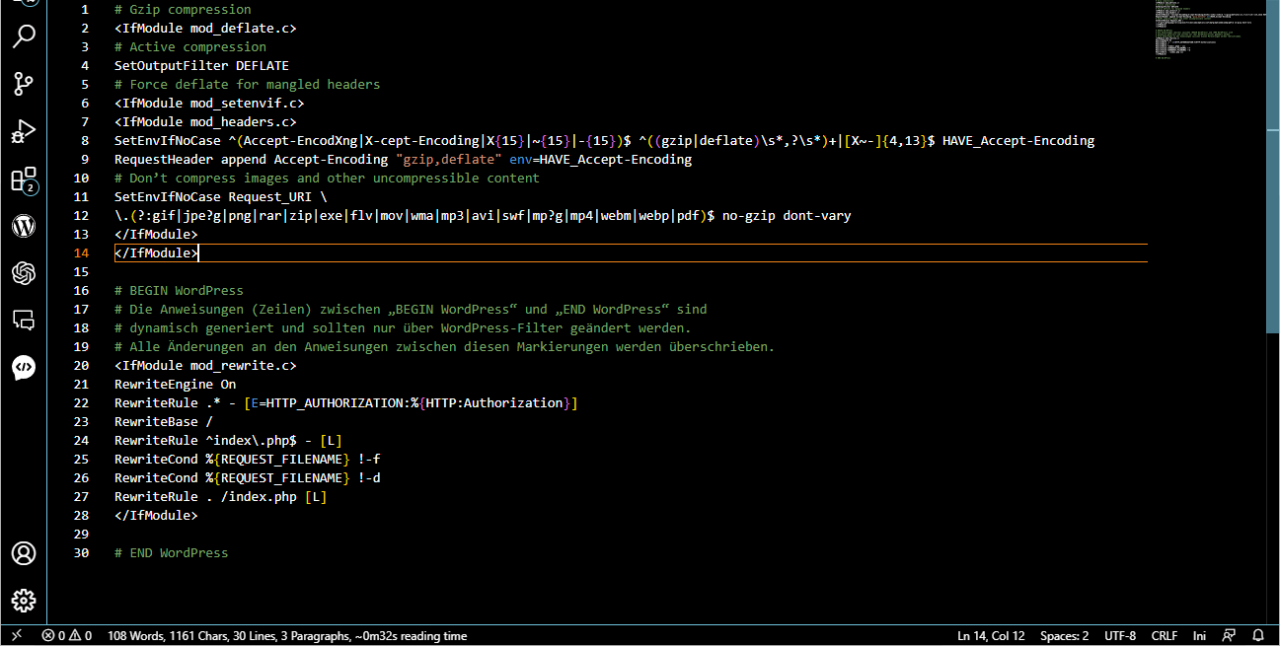
The comparison between Nginx vs Apache configuration systems starts with one main difference: the centralization in Nginx vs the granular customizability in Apache.
Nginx relies on a single configuration file, which is beneficial for quick deployment and easy management. Apache, on the other hand, offers the .htaccess file, which is customizable at the folder level for granular control.
Advantages and disadvantages of centralization
- Advantages: Simplified administration, lower error rate
- Disadvantages: Less flexibility with complex setups
Advantages and disadvantages of granular configuration
- Advantages: Greater flexibility, specific customizations
- Disadvantages: Increased administrative overhead, potential security risks
Modular extensions and plugins
Both Nginx and Apache allow the integration of third-party modules and custom plugins. With Apache, the modules are often already integrated into the main package, while Nginx offers a lean base version that can be extended with additional modules.
Common modules for Nginx
ngx_http_ssl_module: For SSL/TLS supportngx_http_gzip_module: For GZIP compression
Common modules for Apache
mod_ssl: For SSL/TLS supportmod_rewrite: For URL rewrites
Virtual Hosting Capabilities
Virtual hosting is essential in modern web environments. Apache uses both name-based and IP-based virtual hosts. Nginx also offers both variants, but with a simpler syntax in the configuration file.
Apache Virtual Hosting
- Name-based: Multiple domains on a single IP address
- IP-based: Each domain has its own IP address
Nginx Virtual Hosting
- Server Blocks: Simplified syntax for hosting multiple domains
- Customizable lists: Easy assignment of IP addresses
Configurability and flexibility are essential aspects when choosing a web server. While Nginx scores with its centralization and easy extensibility, Apache offers more granular control and a wide range of built-in modules. Therefore, depending on the specific requirements, either Nginx or Apache may be the more suitable solution.
Security
NGINX
- NGINX: Provides robust security features such as DDoS protection and SSL support.
- DDoS Protection: NGINX provides robust mechanisms to protect against DDoS attacks, including rate limiting and connection monitoring.
- SSL/TLS: NGINX supports advanced SSL/TLS protocols and enables easy setup of HTTPS, which increases data security.
- Authentication: NGINX offers several authentication methods, including Basic and JWT (JSON Web Token).
- Isolation: NGINX’s architecture allows it to efficiently isolate requests, minimizing the impact of security breaches.
- Web Application Firewall (WAF): Although NGINX itself does not have a built-in WAF, it is compatible with external WAF solutions such as ModSecurity.
Apache
- Apache: Has broad community support for security extensions, but is more vulnerable to attack if not properly configured.
- ModSecurity: Apache provides a built-in web application firewall through the ModSecurity module, which can detect and block a variety of attacks.
- SSL/TLS: Like NGINX, Apache supports modern SSL/TLS protocols and offers a variety of options for fine-tuning SSL configuration.
- Access control: Apache provides detailed directory-level access control through .htaccess files and ACLs (Access Control Lists).
- Authentication: Apache provides a wide range of authentication options, including Basic, Digest, and LDAP.
- Security patches: due to its large community and active development, Apache receives regular security updates and patches.
Web servers have their own security features, and the choice should be based on the specific security requirements of your project.
Authentication / Authorization
Nginx and Apache provide robust methods for authentication and authorization. Apache uses a flexible .htaccess system that allows granular access controls. Nginx, on the other hand, uses a more centralized configuration structure managed in the main configuration file.
Important authentication modules
- Apache: mod_auth_basic, mod_auth_digest
- Nginx: HttpAuthBasicModule
SSL/TLS support
Both Apache and Nginx provide extensive support for SSL and TLS. Apache’s mod_ssl and Nginx’s ngx_http_ssl_module lead the industry in supporting modern encryption algorithms.
Supported protocols:
- Apache: TLS 1.3, TLS 1.2, and older versions
- Nginx: TLS 1.3, TLS 1.2
Security vulnerabilities and their remediation
Both web servers are known for their active community and regular updates. Security vulnerabilities are usually detected quickly and fixed promptly. While Apache has a longer history and therefore has more known vulnerabilities, Nginx has benefited from its younger code base.
Update strategies
- Apache: Uses a CVE tracking system
- Nginx: Release cycles are shorter, but thoroughly tested
The choice between Nginx and Apache should also be based on the particular security requirements of the project. Both web servers offer high security standards, but with different approaches to authentication, encryption and community support.
Market share along with popularity
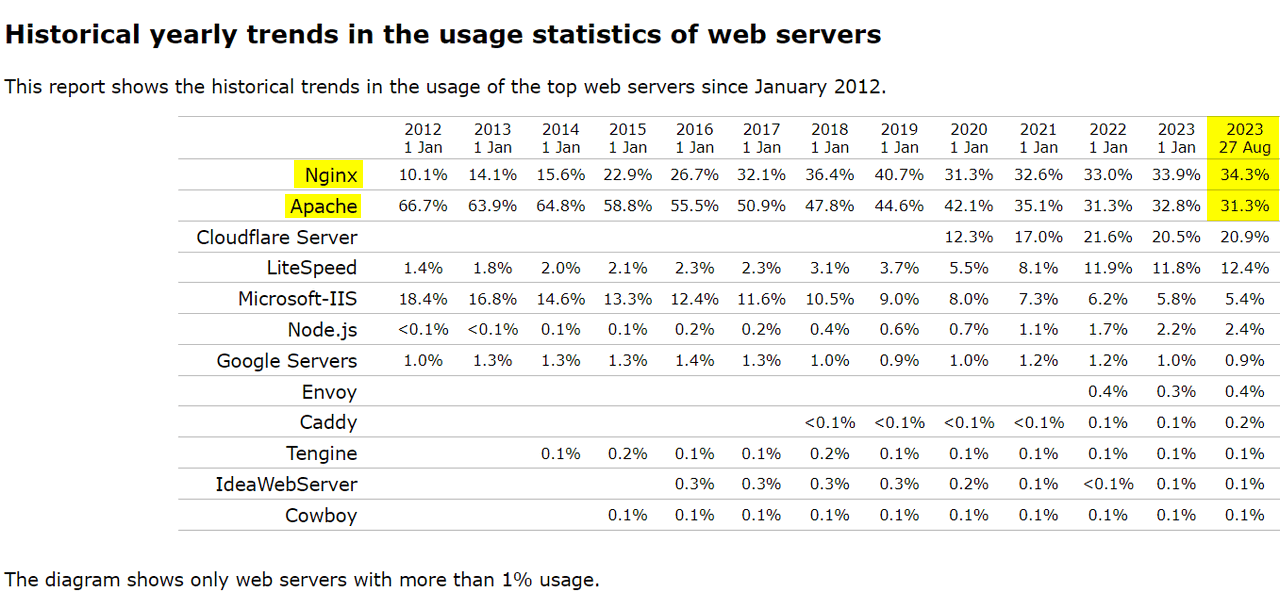
Meanwhile, NGINX has overtaken Apache in the statistics. The table from w3techs shows how a new web server king was crowned in 2022. Followed by Cloudflare and LiteSpeed.
Enterprise usage
Business-critical infrastructures
In the world of enterprise IT, both web servers dominate, but with slightly different focus areas. Apache is often used in complex, mission-critical infrastructures where scalability is less important than proven reliability.
Cloud infrastructures
Nginx, on the other hand, has found its niche in modern cloud infrastructures where the ability to scale quickly and handle high volumes of traffic is paramount.
Popularity in the developer community
Open-source community
Apache enjoys robust community support fostered by decades of development. This has led to a rich collection of modules and extensions ready for almost any use case.
Technological Innovation
Nginx is often considered the “modern” web server, attracting developers interested in the latest technologies and approaches, especially in areas such as microservices or container orchestration.
Impact on SEO and web performance
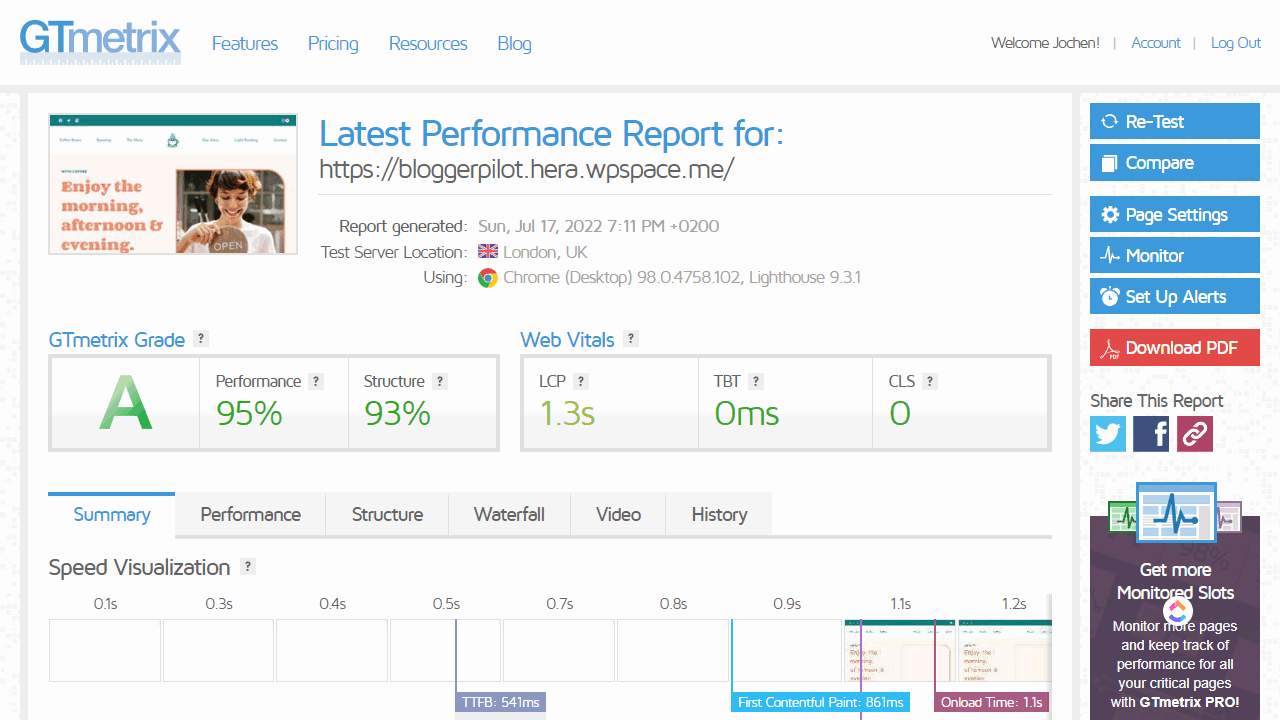
Page speed
The performance of a web server has a direct impact on SEO metrics, especially page speed. Nginx generally offers better results here, primarily due to its ability to efficiently serve static content.
Reliability
However, the reliability and stability offered by Apache can also be SEO-boosting, as downtime and connectivity issues are viewed negatively by search engines.
Trends and future prospects
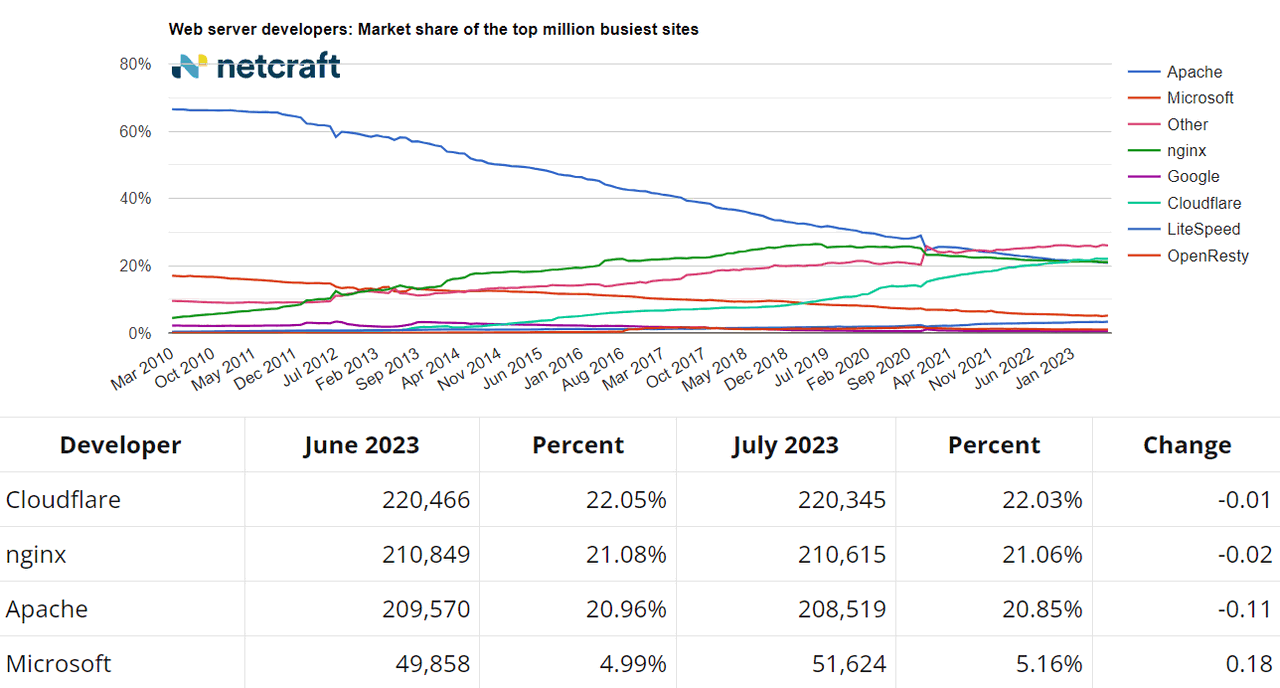
Movement towards microservices
The current trend is clearly towards microservices architectures and cloud-native applications. In this context, Nginx is gaining ground.
Traditional Web Applications
However, for traditional web applications and especially content management systems like WordPress, Apache remains a solid choice.
Overall, the choice between Nginx and Apache is not just a matter of technical specifications, but also a matter of specific deployment scenario and long-term strategy.
Case studies
Nginx in high-traffic scenarios
The relevance of Nginx in high-traffic environments cannot be overstated. Companies like Netflix and Cloudflare rely on Nginx to efficiently process billions of requests per day. These companies value Nginx’s event-driven architecture and asynchronous I/O model.
Key elements
- Low-latency data transfer: The ability to process massive amounts of data with minimal latency is critical for streaming services and real-time applications.
- Scalability: Nginx supports vertical and horizontal scaling options that allow for easy capacity expansion.
- Caching strategies: Advanced caching methods such as FastCGI caching further improve performance.
Apache in traditional enterprise environments
Apache is the standard in many traditional enterprise environments, especially for deploying internal applications and databases. Its process-driven model and rich set of modules make it a versatile choice.
Key elements
- Integration capability: Apache integrates seamlessly with existing enterprise systems and databases.
- Extensibility: With a wide range of available modules, Apache can be customized for a variety of use cases.
- Security features: Robust authentication options and granular access controls facilitate compliance with enterprise policies.
Hybrid solutions and reverse proxies
It’s not uncommon to see Nginx and Apache in a hybrid architecture. In such scenarios, Nginx often acts as a reverse proxy, forwarding incoming traffic to Apache servers.
Key elements
- Load balancing: Nginx can efficiently distribute traffic across multiple Apache servers to improve performance and availability.
- SSL/TLS handshake optimization: Using Nginx as a front-end proxy enables more efficient SSL/TLS negotiation.
- Traffic control: using Nginx as a gateway allows traffic rules and routing strategies to be managed centrally.
The choice between Nginx and Apache is rarely binary. What is common, however, is usually the foundation on GNU Linux. These case studies illustrate that both web servers have their strengths and weaknesses, and that often a combination of the two is most effective.
Community and support
For organizations that rely on extensive support networks, Apache’s established ecosystem gives it an advantage. However, Nginx has made significant strides recently and now offers premium support options.
NGINX
- NGINX: Has a smaller but growing community. Professional support is available.
- Community Size: Although NGINX has a smaller community than Apache, it is still active and growing.
- Forums and Online Resources: There are numerous forums, blogs, even online courses that focus on NGINX and provide a wealth of information.
- Professional Support: NGINX, Inc. offers professional support and consulting services, which is especially beneficial for enterprise customers.
- Events: There are special NGINX conferences and webinars that provide deep insight into the latest developments and best practices.
- Community Contribution: The community is actively involved in NGINX development, including reporting bugs and developing enhancements.
Apache
- Apache: Enjoys a large, active community alongside a wealth of documentation.
- Community Size: Apache has one of the largest and most active open-source communities, offering a wide range of resources and experiences.
- Documentation: The extensive documentation and numerous tutorials make Apache a user-friendly option.
- Mailing Lists and Forums: Apache has a very active mailing list and numerous forums that allow for quick troubleshooting.
- Events: ApacheCon along with other events provide opportunities for networking and learning new skills.
- Longstanding Presence: Because of its longstanding presence, Apache has a wealth of best practices and case studies that are publicly available.
Support Channels:
- Apache: Apache Software Foundation, mailing lists, forums
- Nginx: Official forum, Stack Overflow, premium support for Nginx Plus
Both have their own strengths: While Apache has a larger community and more resources, NGINX offers professional support and specialized events. The choice should also be based on the type of support and community that best fits your project needs.
Guide to choosing the right web server
High-traffic scenarios
For high-traffic scenarios, especially when serving static content, Nginx has the advantage in terms of performance and resource efficiency.
Flexibility and configurability
If your project requires a high degree of flexibility in configuration, Apache can score with its granular configuration options.
Security requirements
In terms of security, both web servers offer solid fundamentals, but the choice depends on your specific security policies and existing expertise.
Enterprise environment
Apache has its strengths in traditional enterprise environments, where years of experience and comprehensive support are required.
Developer Community
For projects closely tied to modern developer tools and practices, Nginx offers a more modern and flexible architecture.
Recommendations for specific deployment scenarios
E-commerce platforms
For e-commerce platforms where performance, security and scalability are paramount, Nginx would be a wise choice.
Content management systems
Apache shows its strengths when working with content management systems like WordPress, primarily through its .htaccess support.
API backend services
Nginx is optimal for setting up API gateways or backend services, thanks to its excellent reverse proxy capabilities and low latency.
Hybrid solutions
In complex infrastructures that require a combination of traditional and modern, Apache and Nginx can even be used in complementary ways.
The decision between Nginx and Apache is not a black-and-white question. Both servers have their justification and may be the better choice depending on the context.
Strategic questions to ask when making a decision
- What are the performance requirements of your site, and how does that match the strengths of NGINX and Apache?
- How important is community support to your project?
- What specific security requirements does your site have, and which web server can best meet them?
Deployment scenarios: When NGINX and Apache are the right choice
NGINX is suitable for:
NGINX is particularly suitable for highly scalable and performance-critical web applications. Its asynchronous architecture makes it ideal for environments that need to handle a high number of concurrent connections. NGINX is also a good choice for applications that require a reverse proxy or load balancer, as well as for developers who prioritize efficient resource usage and fast response times.
Apache is suitable for:
Apache is a versatile choice that works well for a wide range of web projects, from small personal blogs to large enterprise websites. Apache’s modular architecture and extensive community support make it particularly flexible and customizable. It is ideal for developers who need a variety of modules and detailed configuration control.
Check which web server is being used
To find out which technologies a website is using in live operation, we can analyze the HTTP response headers.
To do this, right-click on the web page and select the “Examine” option. In the developer tools, we navigate to the network panel and refresh the web page. This will display all the resources that the web page is loading.
Selecting a resource and the Response Header section will give you information about the server. For example, if the website uses a CDN service, you might see “Cloudflare” in the server line or “Varnish” if an HTTP accelerator is used. The web hosting panel wit “PleskLin” or “cPanel” can also be partially detected here.
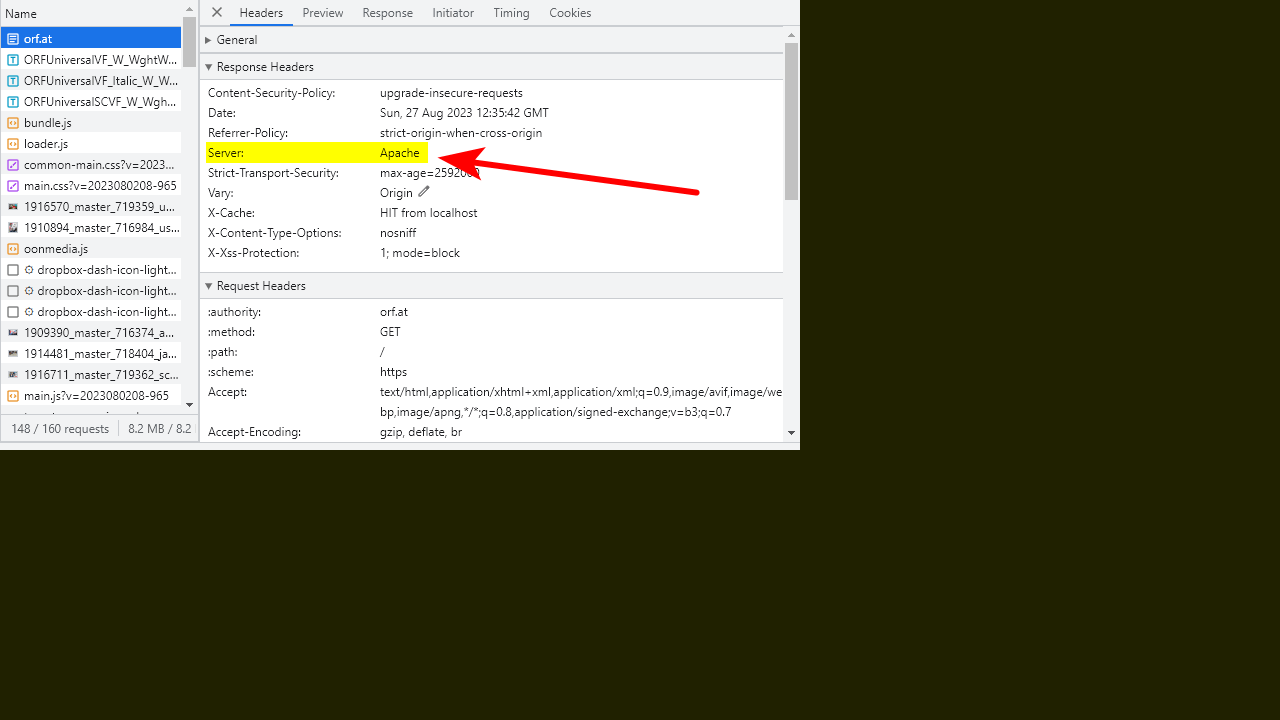
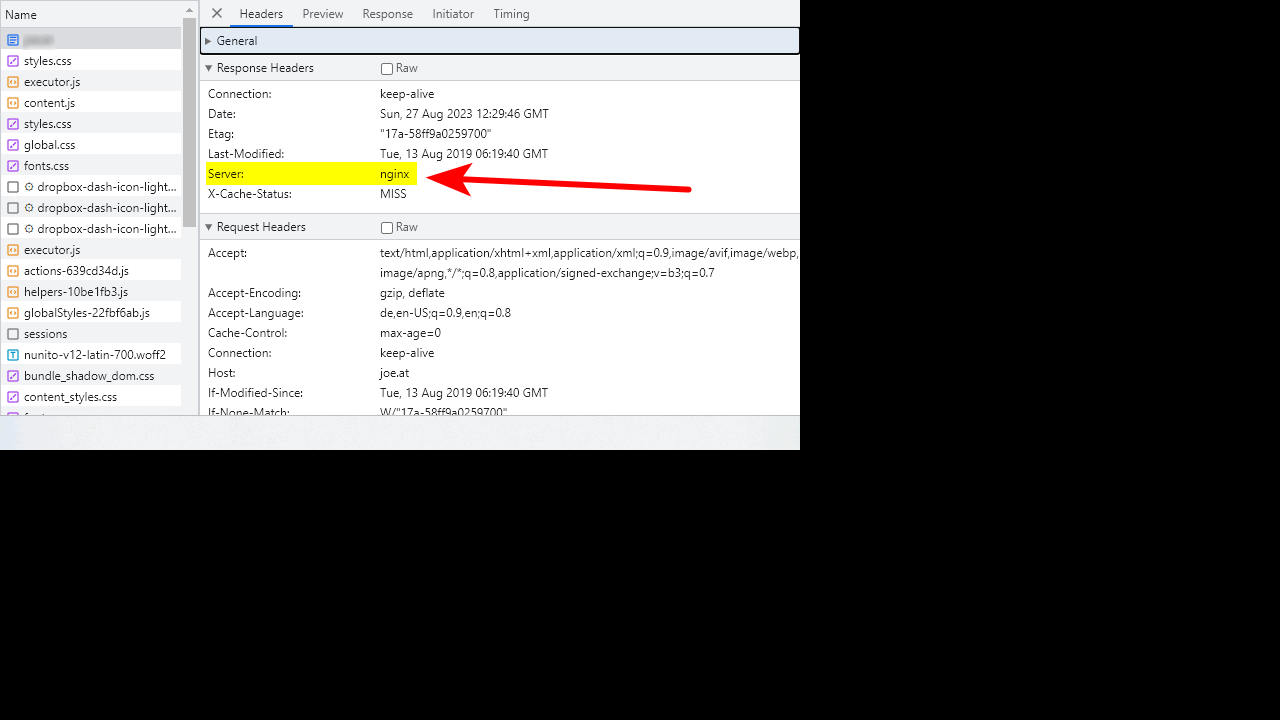
My decision for Apache as web server
For me, too, the question “Apache vs NGINX” has come up more than once. In my role as a professional blogger, I have chosen Apache as my web server mainly because of the flexibility that the .htaccess files provide. These files allow me to make granular configurations at the directory level without affecting the main server.
This is especially useful for my various projects on BloggerPilot and KursProfi, where I need specific settings for URL redirects, security rules, or caching. Being able to make these adjustments myself gives me the control and flexibility I need for my diverse content marketing needs.
NGINX vs Apache FAQ
This review is part of my hosting comparison
For the full rundown, check out the best WordPress hosting.
Best WordPress Hosting
Hosting recommendations are usually garbage.
Often extremely cheap hosting packages for $ 3 are recommended, others advertise a $ 100 VPS, because they earn the most as an affiliate thereby. In the end, we all just want the fastest possible web space for as little money as possible.
And optimized for WordPress!
What else is important? The server should be a fast backbone for your website and the support should answer as fast as possible, and preferably in your language.
You can get all this at Cloudways from $ 10,00 / month.
Conclusion
The choice between NGINX or Apache depends on several factors such as performance, security and specific requirements. NGINX offers faster speeds and is resource efficient, while Apache is known for its flexibility and community support.
Both web servers run on Linux, BSD Unix and Windows.
Of course, the merits vary depending on the use case, and besides Apache and NGINX there are other suitable solutions such as LiteSpeed, Lighttpd, IIS, or Caddy.
NGINX vs Apache, what did you choose?
